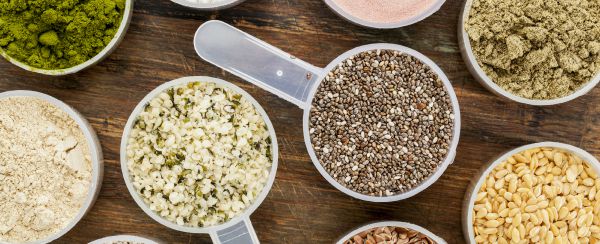21
Sep

Whether you are a fan of protein supplements or not, each day they are becoming more and more present on the market. In fact, take any fitness magazine and you will find a lot of articles about the winning combination of protein powder and exercise. They claim that protein can help you promote a healthier weight and help your muscles recover faster after a good gym workout.
But with the endless protein supplement options, how to choose the best one for your body? Below is a concise explanation of the most important benefits of the best protein powder supplements and the way they can help your diet.
When it comes to building muscles, nothing beats whey protein. It is the most popular protein supplement on the market as it stimulates muscle growth before and after working out.
Pros – Researches show that whey protein supports cardiovascular as well as overall health, and it also promotes lean muscle growth and fat loss. Since the body quickly absorbs it, whey protein is the best recovery supplement to take after a workout. What is more, it is an affordable source of protein that comes in a variety of flavours such as vanilla, chocolate, mint and ice-cream.
Cons – The natural sugar that milk contains, lactose, is a common allergen which makes whey protein indigestible for some people. Moreover, regarding the tasty flavours, they usually come with a host of chemicals and artificial sweeteners which are not appropriate for athletes.
Casein protein powder supplements are another great source of protein. The best way to consume them is before bedtime as they give your body the necessary amount of amino acids.
Pros – The benefits are almost the same as the ones from whey protein. The only difference being the longer release process of the casein protein. That is the main reason why it is best to take casein protein before bedtime.
Cons – As it comes from the milk separation process, casein protein is not suitable for all athletes because of its lactose. Furthermore, it is not the ideal option for a post-workout supplement because of the long absorption process. Moreover, it is more costly than the whey protein.
As the name suggests, egg protein comes from eggs, precisely from the egg white.
Pros – Besides proteins, egg protein powder supplements are extremely rich in vitamins and minerals.
Cons – Allergies to eggs are nothing new and they are mostly present in children and young adults. The main con is that egg protein supplements are one of the most expensive proteins, and this makes them unsuitable for every pocket.
Soy beans are one of the few protein sources that offer the most essential amino acids for our body.
Pros – The greatest benefits of taking soy protein powder supplements is that soy helps improve the body’s immune function, promoting bone health. Moreover, it also prevents cardiovascular diseases and reduces the risk of certain cancers.
Cons – Recently, soy has been the main topic because it is genetically modified in order to produce greater crop yields. Additionally, more and more studies show that soy has significant effects on hormone levels, which makes it an unhealthy option.
Nope, we are not wrong! New studies show that besides carbohydrate, rice, especially brown rice, is the perfect vegetarian protein powder product.
Pros – The contained protein in rice, especially the one in brown rice, is considered the prefect source of complex Vitamin B, carbohydrates and fiber. Moreover, as it is hypoallergenic, it is the most easily digestible product, perfect for all athletes.
Cons – As we all know, rice is a plant-based option, thus, it is low in amino acids.
For those who did not know, hemp protein is obtained straight from the cannabis plant seeds.
Pros – Hemp protein is considered as a superfood because of its mix of essential fatty acids and 21 amino acids. It is a hypoallergenic food and it is appropriate for vegetarians and vegans.
Cons – As it is harvested only in selected countries, hemp is the most expensive protein powder supplement on the market.
Never heard of it? Do not worry, you are not the only one! Pea protein comes from the amazing yellow split pea, making it the perfect choice for vegetarians and vegans as well.
Pros – Along with few additives and artificial ingredients, this plant-based protein is a hypoallergenic and the most rich source of protein.
Cons – Even though it is extremely high in amino acids, pea protein still lacks some important amino acids, so it is not recommendable to be used as a primary source of dietary protein.